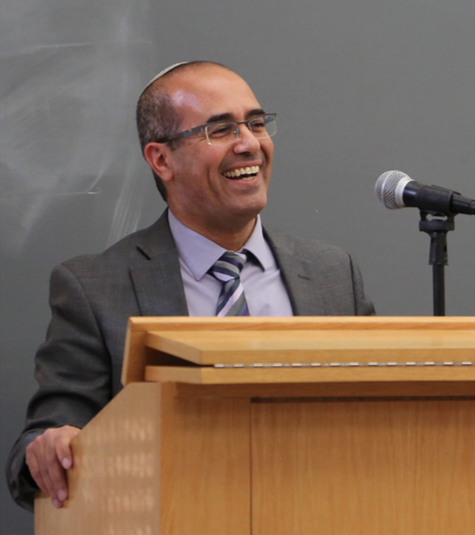At 5 p.m. on Wednesday, Mar. 30, Connecticut College Hillel hosted an event entitled “Palestinians and Israelis: Building Economic Pathways to Peace” in Blaustein 210. This event represented the culmination of the work of Simon Luxem- burg ’18, Daniel Kramer ’18 and Connor Wolfe ’17, who together entered the very first Campus Pitch Competition. A joint initiative between the World Jewish Congress and the Israeli Consulate in New York, the three students worked to present their idea for this event and were ultimate- ly awarded a grant of $2,500 to make their plan a reality.
The event featured two speakers, Bassem Eid and Erez Tzadok, who travel together lecturing on ways in which economic advancement can be used to ensure peace in the region. Eid is Pales- tinian political analyst based in Jerusalem with a background in Arab and Palestinian affairs. Tzadok is the CEO of Aviv Fund Management, and is an expert on global markets and investments in Israel. To- gether with Interim Dean of Institutional Equity David Canton as moderator, they lectured in front of a full room.
Tzadok spoke first, explaining right away that while his background is in business, he “believe[s] in coexistence,” and aims to achieve it though investing in ethical companies. The speakers’ main example of a company in the region was SodaStream, which manufactures a home device to carbonate water and create your own soda. SodaStream was the source of controversy in 2015 when they closed their largest factory, located in the West Bank, after pressures from the international BDS movement.
The boycott surprised him, he said, because of all of the workers in the SodaStrean factory, half were Palestinians. He said that in the region there are approximately 50,000 Palestinians working in factories like SodaStream’s, many of which are owned by Israelis, and that these workers are paid more than five times that of Palestinians working in other companies. The money these workers earn in the factories goes right back into the Palestinian economy through private con sumption, though there are still very high rates of unemployment (approximately 20% in the West Bank, and an even higher rate of 45% in the Gaza Strip).
sumption, though there are still very high rates of unemployment (approximately 20% in the West Bank, and an even higher rate of 45% in the Gaza Strip).
Because of this information, Tzadok advocated for more factories to be built in Palestine and chided the BDS movement, saying he didn’t understand it and that they “want Israel out of Israel.” In these factories, Tzadok said, Palestinians and Israelis “get equal rights, equal opportunities.” Furthermore, he said, no one ever gets hurt at the hands of another human. These factories are places of peace, he said, and “we need to take advantage of the economy” to continue to create peace.
Eid, whose voice boomed in comparison to Tzadok’s more level tone, said the ordinary Palestinians are seeking three things: a job, an education and healthcare. They are “seeking dignity, rather than identity,” he began. Eid was particularly critical of BDS, as well as the Palestinian Authority, during the course of his talk. “Everyone around the world is trying to sacrifice the Pal-estinians,” he said, before adding that this included the Palestinian Authority, who he later said had not built a single school in Palestine.
He called BDS a prelude to the genocide of the Palestinian economy, and insisted that there is no support for BDS in the Gaza Strip or the West Bank (he echoed this later in the question and answer session). “People would throw shoes on someone in a refugee camp who supports BDS,” he said.
His criticism of BDS came mainly from what he saw as a removal of BDS from Palestine. “[BDS knows] that they are totally disconnected from the situation,” he said. “Who authorized BDS to speak on behalf of the Palestinian people?”
“We don’t want to die,” Eid said. “We want to survive.” Thousands of Palestinians cross the border into Israel every morning to go to work, he said.
Towards the end of his talk, Eid had a message specifically for college students: “Don’t try and add more and more obstacles to the conflict,” adding that the situation is more complicated than students realize. Instead, he encouraged students to demand transparency in how American tax money is spent, as it relates to Israel and Palestine.
Following the individual lectures was a question and answer session for the remainder of the time. Luxemburg spoke with the Voice via email after the event, and said he was particularly happy with the large turnout from students, faculty, staff and even members of the larger community.
Tzdaok’s argument for investing in socially responsible and ethical companies resonated with Luxemburg, adding “from an economic and financial perspective, [his] argument is common and is frequently practiced by many investors today.” Acknowledging that Eid’s opinion can be considered unpopular, Luxemburg said that it was “valuable to learn about Bassem’s experiences working towards not only long term peace in the region, but true coexistence for all peoples.”
Though the semester is almost done, Hillel is still planning numerous events, including the annual Jerusalem Food Tour co-sponsored with Yalla Bina, a traditional Passover seder in April and an observation of Yom HaShoah, the remembrance of the over six million Jewish victims of the Holocaust. •









